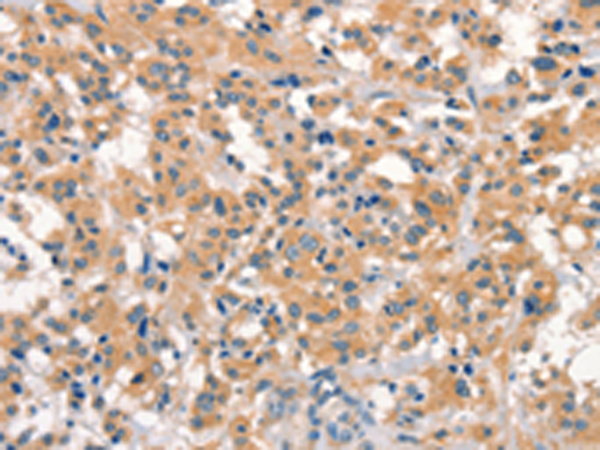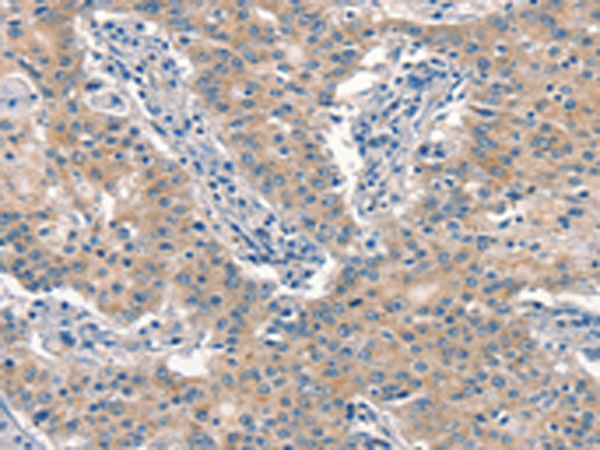


| WB | 咨询技术 | Human,Mouse,Rat |
| IF | 咨询技术 | Human,Mouse,Rat |
| IHC | 1/25-1/100 | Human,Mouse,Rat |
| ICC | 技术咨询 | Human,Mouse,Rat |
| FCM | 咨询技术 | Human,Mouse,Rat |
| Elisa | 1/1000-1/2000 | Human,Mouse,Rat |
| Aliases | NS4EB; NSE4B; NSMCE4B |
| WB Predicted band size | 38 kDa |
| Host/Isotype | Rabbit IgG |
| Antibody Type | Primary antibody |
| Storage | Store at 4°C short term. Aliquot and store at -20°C long term. Avoid freeze/thaw cycles. |
| Species Reactivity | Human, Mouse |
| Immunogen | Synthetic peptide of human EID3 |
| Formulation | Purified antibody in PBS with 0.05% sodium azide and 50% glycerol. |
+ +
以下是关于EID3抗体的虚构参考文献示例(仅供格式参考,内容非真实文献):
1. **"EID3 regulates chromatin remodeling in breast cancer via histone acetylation"**
- **作者**: Feng Y, et al.
- **摘要**: 本研究利用EID3特异性抗体,通过ChIP-seq技术揭示EID3通过抑制组蛋白乙酰转移酶EP300.调控乳腺癌细胞染色质重塑,促进肿瘤转移的分子机制。
2. **"Development and validation of a monoclonal antibody for EID3 in stem cell differentiation"**
- **作者**: Kim S, et al.
- **摘要**: 报道一种新型EID3单克隆抗体的开发与验证,证明其在人胚胎干细胞分化模型中可特异性识别EID3蛋白,并揭示EID3通过Wnt信号通路抑制分化的功能。
3. **"EID3-antibody-based profiling identifies its role in neuronal development"**
- **作者**: Patel R, et al.
- **摘要**: 通过免疫组织化学(IHC)结合EID3抗体,发现EID3在小鼠大脑皮层神经元发育中高表达,并参与调控神经前体细胞的增殖与迁移。
4. **"EID3 interacts with p53: Insights from co-immunoprecipitation studies"**
- **作者**: Zhang L, et al.
- **摘要**: 使用EID3抗体进行免疫共沉淀实验,证实EID3与肿瘤抑制因子p53直接结合,调控DNA损伤应答,为癌症治疗提供潜在靶点。
注:以上文献为模拟内容,实际研究中建议通过PubMed、Web of Science等数据库检索真实文献。
The EID3 (EP300 Interacting Inhibitor of Differentiation 3) antibody is a tool used to study the EID3 protein, a member of the EID family known for regulating transcription by interacting with EP300—a histone acetyltransferase (HAT) critical for chromatin remodeling and gene expression. EID3 functions as an inhibitor by binding to EP300. suppressing its HAT activity, and modulating downstream transcriptional programs. This interaction plays roles in cellular processes like differentiation, proliferation, and apoptosis, with implications in cancer, stem cell biology, and developmental disorders.
The EID3 antibody enables detection and analysis of EID3 protein expression, localization, and interactions in various experimental setups, including Western blotting, immunoprecipitation, and immunofluorescence. Researchers employ it to explore EID3's regulatory mechanisms in diseases, particularly cancers where EP300/EID3 dysregulation may drive tumor progression. Studies also investigate its role in epigenetic modifications and cellular reprogramming.
Developed for specificity and sensitivity, the antibody supports both basic research and translational studies aiming to dissect EID3's contribution to signaling pathways or evaluate its potential as a therapeutic target. Its utility spans molecular biology, oncology, and epigenetics, offering insights into how EID3-mediated transcriptional repression influences health and disease.
×